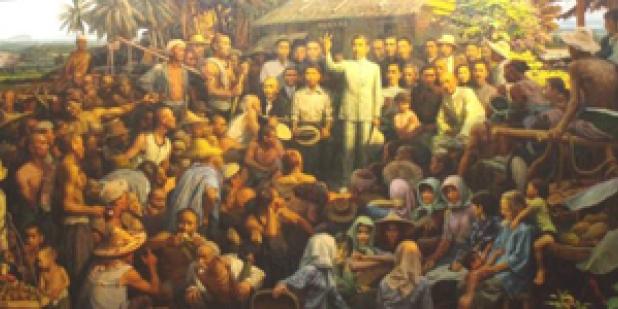Join us for a free one-day workshop for educators at the Japanese American National Museum, hosted by the USC U.S.-China Institute and the National Consortium for Teaching about Asia. This workshop will include a guided tour of the beloved exhibition Common Ground: The Heart of Community, slated to close permanently in January 2025. Following the tour, learn strategies for engaging students in the primary source artifacts, images, and documents found in JANM’s vast collection and discover classroom-ready resources to support teaching and learning about the Japanese American experience.
Manuscript Review - Writing the South Seas: Postcolonial Literature and the Nanyang Imagination
Leading scholars in the field of Chinese literature will discuss a new book manuscript by Brian Bernards, Assistant Professor of East Asian Languages and Cultures at USC. Graduate students and faculty from USC and the community are welcome to attend. Interested attendees must read the manuscript.
Where

Leading scholars in the field of Chinese literature will discuss a new book manuscript by Brian Bernards, Assistant Professor of East Asian Languages and Cultures at USC, entitled Writing the South Seas: Postcolonial Literature and the Nanyang Imagination. Manuscript discussants include Laurie J. Sears, Professor of History and Director of the Southeast Asia Center at the University of Washington, and Lingchei Letty Chen, Associate Professor of Modern Chinese Literature and Chair of the East Asian Studies Committee at Washington University in St. Louis.
Graduate students and faculty from USC and the community are welcome to attend. Interested attendees must read the manuscript. To secure your spot and request a copy of the manuscript, please rsvp to eascrsvp@dornsife.usc.edu.
Manuscript Synopsis:
Nanyang, the “South Seas,” is the traditional Chinese term for Southeast Asia. Unlike “Southeast Asia,” which reflects a Eurocentric continental epistemology, Nanyang is an archipelagic, though Sinocentric, concept. It envisions the tropical southern seascape as connecting rather than separating the peninsular and island landscapes of the region. The term’s varied connotations reflect its rich history, including imperial maritime voyages to tributary, “barbarian” kingdoms, massive transoceanic migrations of Chinese populations during the era of Western imperialism and Japanese occupation, and twentieth-century convergences of competing diasporic, settler, and indigenous nationalisms in the region. Writing the South Seas traces the transcolonial legacy of Nanyang as a literary trope in modern Chinese literature and explores its transnational and translingual “afterlives” in the postcolonial literatures of Malaysia, Singapore, and Thailand. In ways specific to each discursive context, the Nanyang imagination exposes the colonial origins of hegemonic racial, ethnic, cultural, and linguistic paradigms, critiques dominant diasporic and indigenous nationalisms as well as their definitions of national literatures, retraces histories of migration, settlement, and creolization, and articulates suppressed modes of affiliation with local and regional ecology.
Featured Articles
Please join us for the Grad Mixer! Hosted by USC Annenberg Office of International Affairs, Enjoy food, drink and conversation with fellow students across USC Annenberg. Graduate students from any field are welcome to join, so it is a great opportunity to meet fellow students with IR/foreign policy-related research topics and interests.
RSVP link: https://forms.gle/1zer188RE9dCS6Ho6
Events
Hosted by USC Annenberg Office of International Affairs, enjoy food, drink and conversation with fellow international students.
Join us for an in-person conversation on Thursday, November 7th at 4pm with author David M. Lampton as he discusses his new book, Living U.S.-China Relations: From Cold War to Cold War. The book examines the history of U.S.-China relations across eight U.S. presidential administrations.




